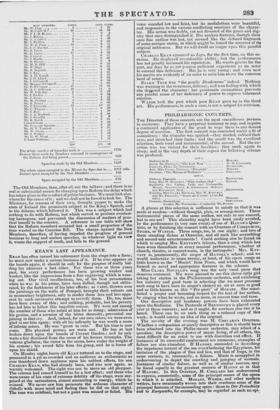KEAN'S LAST APPEARANCE.
KEAN has often turned his retirement from the stage into a farce; he must now make a serious business of it. If he ever appears on the boards again, it should be only for the purpose of really bid- ding his admirers a last adieu. For these two or three years past, his every performance has been growing weaker and weaker, like the impressions from a fine engraving which is wear- ing out. Our vivid recollections, too, of his best personations when he was in his prime, have been dulled, though not oblite- rated, by the feebleness of his later efforts; as e ater, thrown over the paintings on the walls of Pompeii, brought their colours out in momentary brightness, only to render them less and less appa- rent by each successive attempt te revivify them. He, too, must have been aware of this; and nothing, probably, but his poverty has led him to follow this impolitic course. We were not among the number of those who railed at him for so doing ; admiration of his genius, and a surmise of the bitter decessity, prevented our joining in that cry. And, indeed, for our own sakes, we were even glad to see him again; with all his infirmity he was worth a score of inferior actors. He was "great in ruin.' But his time is now come. His physical powers are worn out. He has at last broken down upon the boards of Covent Garden ; and he only waits a fair dismissal from the scene of his former triumphs. The veteran gladiator, the victor in the arena, bows under the weight of his armour ; his sword falls from his grasp, and he is borne off' upon his shield.
On Monday night, brave old KEAN tottered on to the stage, and presented to a pit as crowded and an audience as enthusiastic as ever thundered down applause upon his noblest efforts, his son CHARLES KEAN who had already been, and was now again, as warmly welcomed. The sight was one to move an old playgoer. The veteran had roused himself as for a last effort; and those who were aware of his state of extreme debility off the stage, were sur- prised at the earnestness, almost amounting to energy, which he evinced. We never saw him personate the arduous character of Othello with more mind and feeling than he did on that night. The tone was subdued, but not a point was missed or failed. His voice sounded low and faint, but its modulations were beautiful, and responsive to the various conflicting emotions of the charac- ter. His action was feeble, yet not divested of the grace and dig- nity that once distinguished it. His sunken features, though their once fine outline was lost, yet seemed like the defaced fragment of some antique statue, in which might be traced the remains of its original nobleness. But we will dwell no longer upon this painful subject. CHARLES KEAN appeared as Iago, for the first time, on this oc- casion. He displayed considerable ability • but the performance has not greatly increased his reputation. He wants genius for the part, nor does he as yet possess sufficient experience as an actor to conceal this deficiency. But lie is very young; and even now his merits are evidently of an order to raise him above the commoa herd of actors.
ELLEN TREE was "tile gentle Desdemona" indeed. Nothing was wanting to the sweetness, delicacy, and true feeling with which she depicted the character : her passionate earnestness prevents any painful sense of her deficiency of power to express vehement emotion.
WARDE took the part which poor KEAN gave up in the third act. His performance, in such a case, is not a subject for criticism.


















 Previous page
Previous page